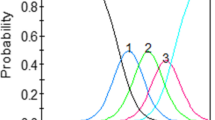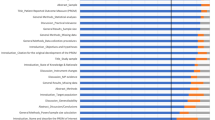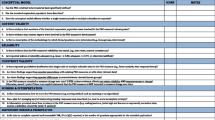Abstract
Purpose
Content validity of patient-reported outcomes (PROs) is evaluated primarily during item development, but subsequent psychometric analyses, particularly for item response theory (IRT)-derived scales, often result in considerable item pruning and potential loss of content. After selecting items for the PROMIS banks based on psychometric and content considerations, we invited external content expert reviews of the degree to which the initial domain names and definitions represented the calibrated item bank content.
Methods
A minimum of four content experts reviewed each item bank and recommended a domain name and definition based on item content. Domain names and definitions then were revealed to the experts who rated how well these names and definitions fit the bank content and provided recommendations for definition revisions.
Results
These reviews indicated that the PROMIS domain names and definitions remained generally representative of bank content following item pruning, but modifications to two domain names and minor to moderate revisions of all domain definitions were needed to optimize fit with the item bank content.
Conclusions
This reevaluation of domain names and definitions following psychometric item pruning, although not previously documented in the literature, appears to be an important procedure for refining conceptual frameworks and further supporting content validity.
Similar content being viewed by others
References
Lohr, K., & For the Scientific Advisory Committee of the Medical Outcomes Trust. (2002). Assessing health status and quality-of-life instruments: Attributes and review criteria. Quality of Life Research, 11, 193–205.
Rothman, M. L., Beltran, P., Cappelleri, J. C., Lipscomb, J., Teschendorf, B., & The Mayo/FDA Patient-Reported Outcomes Consensus Meeting Group. (2007). Patient-reported outcomes: Conceptual issues. Value in Health, 10(Suppl. 2), S66–S75.
US Department of Health and Human Services. (2006). Food and drug administration. Guidance for industry. Patient-reported outcome measures: Use in medical product development to support labeling claims. Rockville, MD: US Department of Health and Human Services. http://www.fda.gov/downloads/Drugs/GuidanceComplianceRegulatoryInformation/Guidances/ucm071975.pdf.
Rothman, M., Burke, L., Erickson, P., Kline Leidy, N., Patrick, D. L., & Petrie, C. D. (2009). Use of existing patient-reported outcome (PRO) instruments and their modification: The ISPOR good research practices for evaluation and documenting content validity for the use of existing instruments and their modification PRO task force report. Value in Health, 8, 1075–1083.
Brod, M., Tesler, L. E., & Christensen, T. L. (2009). Qualitative research and content validity: Developing best practices based on science and experience. Quality of Life Research, 18, 1263–1278.
Fries, J. F., Bruce, B., & Cella, D. (2005). The promise of PROMIS: The new sciences behind patient-reported outcomes. Clinical and Experimental Rheumatology, 23, S53–S57.
Cella, D., Yount, S., Rothrock, N., Gershon, R., Cook, K., Reeve, B., et al. (2007). The patient-reported outcomes measurement information system (PROMIS). Progress of an NIH Roadmap cooperative during its first two years. Medical Care, 45(Suppl. 1), S3–S11.
DeWalt, D. A., Rothrock, N., Yount, S., & Stone, A. A. (2007). Evaluation of item candidates: The PROMIS qualitative item review. Medical Care, 45(Suppl. 1), S12–S21.
Castel, L. D., Williams, K. A., Bosworth, H. B., Eisen, S. V., Hahn, E. A., Irwin, D. E., et al. (2008). Content validity in the PROMIS social health domain: a qualitative analysis of focus group data. Quality of Life Research, 17, 737–749.
Christodoulou, C., Junghaenel, D. U., DeWalt, D. A., Rothrock, N., & Stone, A. A. (2008). Cognitive interviewing in the evaluation of fatigue items: Results from the patient-reported outcomes measurement information system (PROMIS). Quality of Life Research, 17, 1239–1246.
Reeve, B. B., Hays, R. D., Bjorner, J. B., Cook, K. F., Crane, P. K., Teresi, J. A., et al. (2007). Psychometric evaluation and calibration of health-related quality of life item banks: Plans for the patient-reported outcomes measurement information system (PROMIS). Medical Care, 45(Suppl. 1), S22–S31.
Amtmann, D., Cook, K. F., Jensena, M. P., Chen, W.-H., Choi, S., Revicki, D., et al. (2010). Development of a PROMIS item bank to measure pain interference. Pain, 150(1), 173–182.
Cella, D., Riley, W., Stone, A. A., Rothrock, N., Reeve, B. B., Yount, S., et al. (in press). Initial item banks and first wave testing of the Patient Reported Outcomes Measurement Information System (PROMIS) network: 2005–2008. Journal of Clinical Epidemiology.
Embretson, S. E., & Reise, S. P. (2000). Item response theory for psychologists. Mahway, NJ: Lawrence Erlbaum Associates.
Hays, R. D., Bjorner, J. B., Revicki, D. A., Spritzer, K. L., & Cella, D. (2009). Development of physical and mental health summary scores from the patient-reported outcomes measurement information system (PROMIS) global items. Quality of Life Research, 18, 873–880.
American Psychiatric Association. (1994). Diagnostic and statistical manual of mental disorders (4th ed.). Washington, DC: American Psychiatric Association.
Frost, M. H., Reeve, B. B., Liepa, A. M., Stauffer, J. W., Hays, R. D., & The Mayo/FDA Patient-Reported Outcomes Consensus Meeting Group. (2007). What is sufficient evidence for the reliability and validity of patient-reported outcome measures. Value in Health, 10(Suppl. 2), S94–S105.
Watson, D. (2005). Rethinking the mood and anxiety disorders: A quantitative hierarchical model for DSM-V. Journal of Abnormal Psychology, 114, 522–536.
Acknowledgments
The patient-reported outcomes measurement information system (PROMIS) is a National Institutes of Health (NIH) Roadmap initiative to develop a computerized system measuring patient-reported outcomes in respondents with a wide range of chronic diseases and demographic characteristics. PROMIS was funded by cooperative agreements to a Statistical Coordinating Center (Northwestern University, PI: David Cella, PhD, U01AR52177) and six Primary Research Sites (Duke University, PI: Kevin Weinfurt, PhD, U01AR52186; University of North Carolina, PI: Darren DeWalt, MD, MPH, U01AR52181; University of Pittsburgh, PI: Paul A. Pilkonis, PhD, U01AR52155; Stanford University, PI: James Fries, MD, U01AR52158; Stony Brook University, PI: Arthur Stone, PhD, U01AR52170; and University of Washington, PI: Dagmar Amtmann, PhD, U01AR52171). NIH Science Officers on this project have included Deborah Ader, PhD, Susan Czajkowski, PhD, Lawrence Fine, MD, DrPH, Laura Lee Johnson, PhD, Louis Quatrano, PhD, Bryce Reeve, PhD, William Riley, PhD, Susana Serrate-Sztein, MD, and James Witter, MD, PhD. This manuscript was reviewed by the PROMIS Publications Subcommittee prior to external peer review. See the Web site at www.nihpromis.org for additional information on the PROMIS cooperative group.
Author information
Authors and Affiliations
Corresponding author
Rights and permissions
About this article
Cite this article
Riley, W.T., Rothrock, N., Bruce, B. et al. Patient-reported outcomes measurement information system (PROMIS) domain names and definitions revisions: further evaluation of content validity in IRT-derived item banks. Qual Life Res 19, 1311–1321 (2010). https://doi.org/10.1007/s11136-010-9694-5
Accepted:
Published:
Issue Date:
DOI: https://doi.org/10.1007/s11136-010-9694-5




